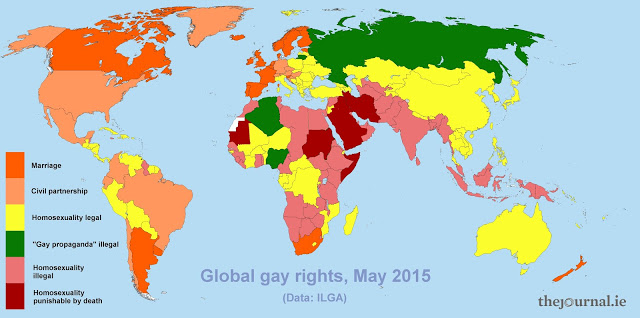What causes homophobia?
Why are some people homophobic?
What are the psychological and biological drivers of homophobia?
This article will attempt to answer these questions.
Homophobia is a pervasive phenomenon that has been known to occur since the dawn of human history. It ranges from having antagonistic attitudes toward homosexuals to engaging in violent acts against them.
Homosexuality is illegal/punishable in many countries of the world as the following picture shows:

If homosexuals have been receiving so much hatred and opposition, it makes sense to assume they’re perceived as a threat by heterosexuals.
In this article, we discuss the possible causes of homophobia:
1) Bisexuals as a reproductive threat
Male bisexuals present a reproductive threat to male heterosexuals. Unlike women, men need to practice sexual techniques and the more they practise the better they become.
Male bisexuals tend to get precocious sexual experience from both men and women at an early age. They can also practice having sexual relations with different personality types which gives them an edge over heterosexual men lacking this experience.1
Also, male intrasexual competition for females is already intense and male bisexuals only aggravate this average competition such that an individual heterosexual male has to compete more to find mates.
This is probably why almost all homophobic violence is directed toward male homosexuals. Lesbianism has never been officially criminalized. Lesbians aren’t as much of a reproductive threat to heterosexual women as gays are to heterosexual men.
2) Risk of disease
Despite having a reproductive advantage over heterosexual males, bisexual males are at a greater risk of contracting sexually transmitted diseases such as syphilis and AIDS.
It is possible that what is known as homophobia is an exaggeration of the natural disgust reaction that most male heterosexuals feel when watching or thinking about male homosexual activity. Disgust, after all, is known to function mainly as a disease-avoidance mechanism.2
It is one thing, however, to feel disgusted toward a homosexual activity or imagining oneself in such activity but an altogether different thing to actively preventing others from engaging in such activity.
Homophobia perhaps wasn’t much of a problem among our nomadic ancestors who lived in small groups where the risk of spreading disease was less but as humanity progressed with inventing agriculture and settling in large populations alongside river valleys, the increase in population density brought with it an increased risk of spreading disease.
This prepared the grounds for enforcing laws banning homosexual activity and explains why most laws that ban homosexual activity today can be traced back to the post-agricultural eras of human civilization.
3) Threat to masculinity
Most heterosexual men are wired to be masculine. Masculine qualities increase their mate value and hence the probability of attracting mates. A large number of gays are feminine and therefore men, by distancing themselves from feminine gays, can reassert their masculinity.
This is why boys, since a young age, tease each other by calling each other “gay” because that’s the last thing they all want to be. From this perspective, homophobia can be viewed as an extreme way of protection of male masculinity.
A Cornell University study found that when men felt their masculinity was threatened, they displayed more homophobic attitudes in an attempt to re-assert their masculinity.3
4) Repressed homosexuality
You might have heard of at least one case of a person who vehemently preached against homosexuality but was himself caught with his pants down, literally, in a homosexual act.
This is the example of a person who had repressed their homosexuality. They knew, deep down, that they had homosexual inclinations but couldn’t come to terms with it or become fully conscious of it perhaps due to the stigma associated with coming out as a homosexual.
So they fought fiercely with anything remotely reminding them of their latent homosexuality, denigrating and shaming homosexuals whenever they got a chance.
A study has shown that homophobia is more pronounced in individuals with an unacknowledged attraction to the same sex and who grew up with authoritarian parents who forbade such desires.4
Furthermore, studies have also revealed that men with homophobic tendencies gaze more at homosexual imagery than other heterosexual men5 and such men even show an increase in penile erection when exposed to male homosexual stimuli.6
References
- Baker, R. (2006). Sperm wars: Infidelity, sexual conflict, and other bedroom battles. Basic Books.
- Curtis, V., De Barra, M., & Aunger, R. (2011). Disgust as an adaptive system for disease avoidance behaviour. Philosophical Transactions of the Royal Society of London B: Biological Sciences, 366(1563), 389-401.
- Cornell University. (2005). Men Overcompensate When Masculinity Is Threatened. ScienceDaily. Retrieved January 14, 2018 from www.sciencedaily.com/releases/2005/08/050803064454.htm
- Weinstein, N., Ryan, W. S., DeHaan, C. R., Przybylski, A. K., Legate, N., & Ryan, R. M. (2012). Parental autonomy support and discrepancies between implicit and explicit sexual identities: Dynamics of self-acceptance and defense. Journal of Personality and Social Psychology, 102(4), 815.
- Cheval, B., Radel, R., Grob, E., Ghisletta, P., Bianchi-Demicheli, F., & Chanal, J. (2016). Homophobia: an impulsive attraction to the same sex? Evidence from eye-tracking data in a picture-viewing task. The journal of sexual medicine, 13(5), 825-834.
- Adams, H. E., Wright, L. W., & Lohr, B. A. (1996). Is homophobia associated with homosexual arousal?. Journal of abnormal psychology, 105(3), 440.
